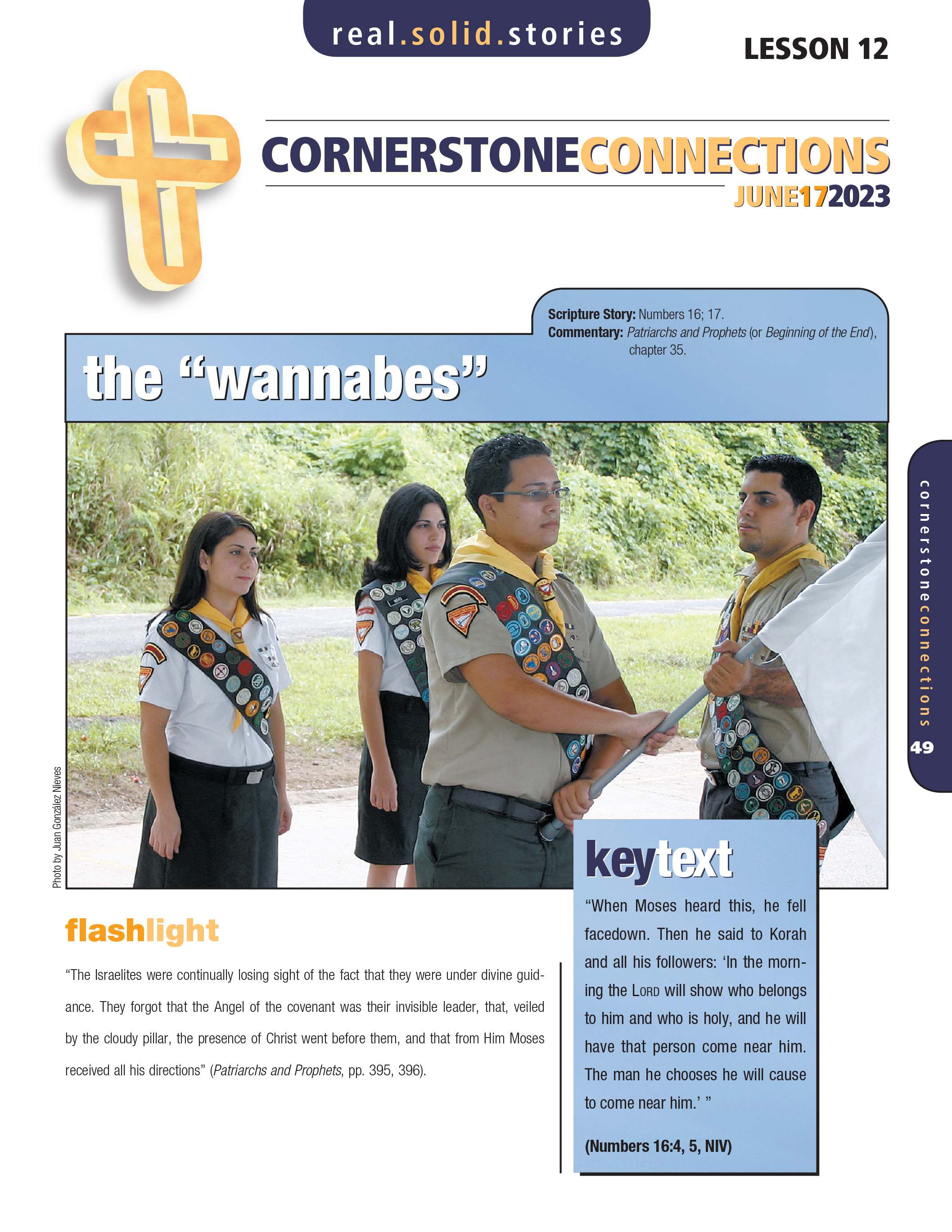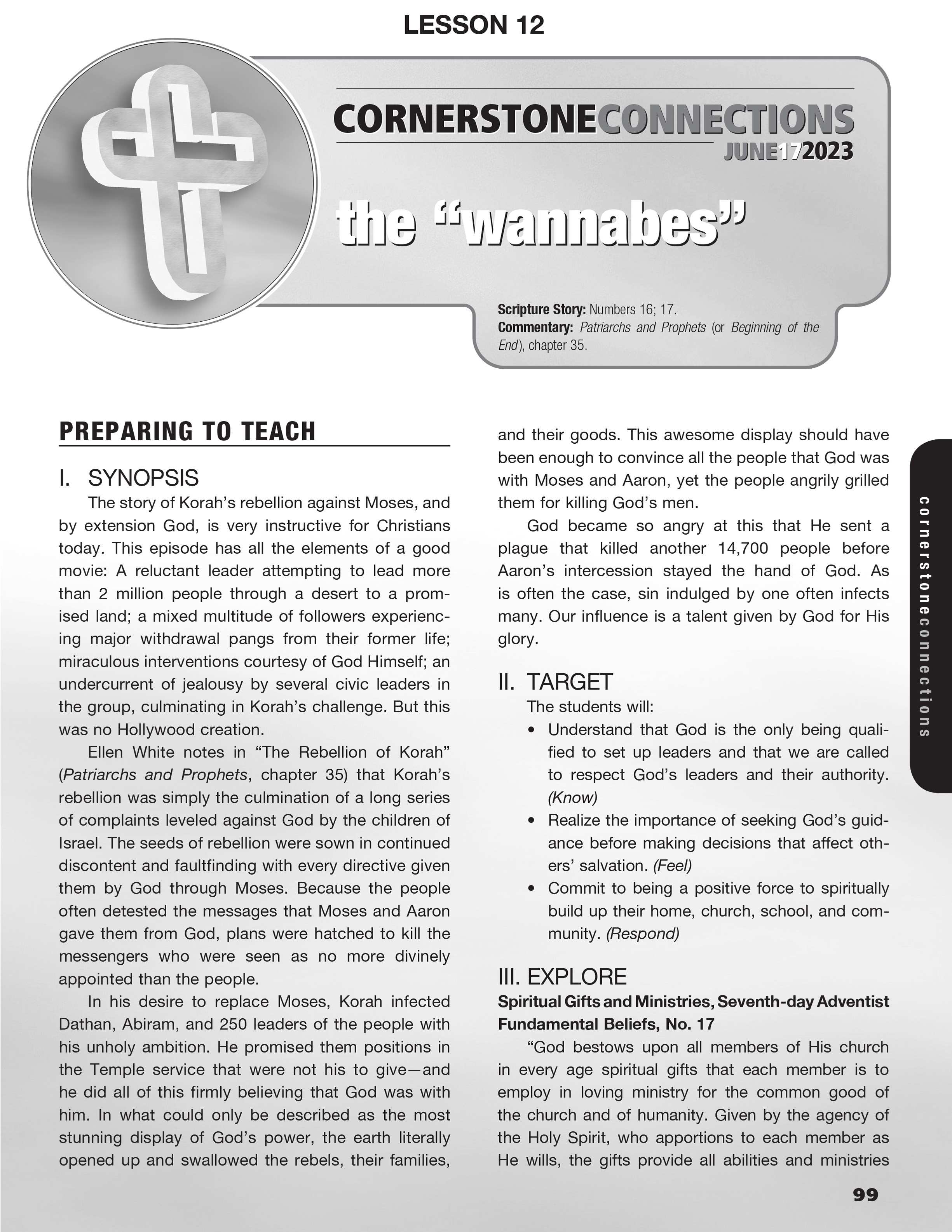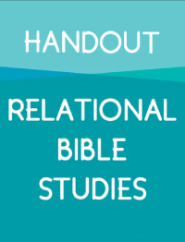“The Wannabes”
Click below to download the Cornerstone Connections leader’s guide and student lesson. This week’s resources also include two lesson plans and a discussion starter video which offer different ways of looking at the topic. Each lesson plan includes opening activities, scripture passages, discussion questions, and real-life applications.
In spite of God’s miraculous interventions on behalf of the Israelites under the leadership of Moses, an undercurrent of jealousy proves disastrous.
SCRIPTURE PASSAGES
OVERVIEW
Actors want to be singers. Singers want to be movie stars. Congress members want to be the president.
Many people have dreams of doing something else that seems more exciting, more impressive, more meaningful, more powerful than what they’re doing now. Those dreams can be good. They can be God-given. Where they become a problem is when we covet what belongs to other people.
Divide the class into two groups, with about two-thirds in Team A and a third in Team B. Have each group pick a leader (or designate based on who you perceive to be a natural leader). Tell Team A that their job is to stick together. Separately, tell Team B that their job is to coerce the other team’s members to join their team, however they can. Give them up to five minutes to act out the scenario.
At the end of five minutes, ask each team who they think the winners and losers are.
DISCUSSSION
TRANSITION
By this point, the Israelites had already been through a lot together—slavery, the ten plagues, the Exodus, Mt. Sinai, and more. They should have been a strong, united community, and yet, people looked for reasons for doubt and dissatisfaction.
Korah and his fellow rebels accused Moses and Aaron of claiming too much power. Levites, Korah’s family was closely related to that of Moses and Aaron (Exodus 6:14-27; Numbers 3:19). What’s striking in this joint rebellion is that the rebels claim that God is on their side—indeed, they want to work for God as priests and leaders. How, then, could they be so in the wrong?
BIBLE STUDY GUIDE
Too far?
This story comes in the wake of the announcement that all the adults who had complained against God would die in the wilderness (Numbers 14:26-39). So, people like Korah likely felt that in taking their stand—even as they claimed to have God on their side—they had nothing to lose.
Read Numbers 16:1-15.
Korah son of Izhar, the son of Kohath, the son of Levi, and certain Reubenites—Dathan and Abiram, sons of Eliab, and On son of Peleth—became insolent 2 and rose up against Moses. With them were 250 Israelite men, well-known community leaders who had been appointed members of the council. 3 They came as a group to oppose Moses and Aaron and said to them, “You have gone too far! The whole community is holy, every one of them, and the Lord is with them. Why then do you set yourselves above the Lord’s assembly?”
When Moses heard this, he fell facedown. 5 Then he said to Korah and all his followers: “In the morning the Lord will show who belongs to him and who is holy, and he will have that person come near him. The man he chooses he will cause to come near him. 6 You, Korah, and all your followers are to do this: Take censers 7 and tomorrow put burning coals and incense in them before the Lord. The man the Lord chooses will be the one who is holy. You Levites have gone too far!”
Moses also said to Korah, “Now listen, you Levites! 9 Isn’t it enough for you that the God of Israel has separated you from the rest of the Israelite community and brought you near himself to do the work at the Lord’s tabernacle and to stand before the community and minister to them? 10 He has brought you and all your fellow Levites near himself, but now you are trying to get the priesthood too. 11 It is against the Lord that you and all your followers have banded together. Who is Aaron that you should grumble against him?”
Then Moses summoned Dathan and Abiram, the sons of Eliab. But they said, “We will not come! 13 Isn’t it enough that you have brought us up out of a land flowing with milk and honey to kill us in the wilderness? And now you also want to lord it over us! 14 Moreover, you haven’t brought us into a land flowing with milk and honey or given us an inheritance of fields and vineyards. Do you want to treat these men like slaves? No, we will not come!”
Then Moses became very angry and said to the Lord, “Do not accept their offering. I have not taken so much as a donkey from them, nor have I wronged any of them.”
DISCUSSION
Incensed rebels get censured
In Numbers 16:5-11 Moses challenged the rebels that if they wanted the authority and responsibilities of the high priest and his family, they could bring fire pans—the incense-filled censers used in sanctuary ceremonies—and let God show what He thought of their claims (Numbers 16:5-11). Yet given how God had struck down Aaron’s own sons when they offered unconsecrated incense (Lev. 10:1, 2), Korah and company should have known they’d fare no better.
Read Numbers 16:16-35.
Moses said to Korah, “You and all your followers are to appear before the Lord tomorrow—you and they and Aaron. 17 Each man is to take his censer and put incense in it—250 censers in all—and present it before the Lord. You and Aaron are to present your censers also.” 18 So each of them took his censer, put burning coals and incense in it, and stood with Moses and Aaron at the entrance to the tent of meeting. 19 When Korah had gathered all his followers in opposition to them at the entrance to the tent of meeting, the glory of the Lord appeared to the entire assembly. 20 The Lord said to Moses and Aaron, 21 “Separate yourselves from this assembly so I can put an end to them at once.”
But Moses and Aaron fell facedown and cried out, “O God, the God who gives breath to all living things, will you be angry with the entire assembly when only one man sins?”
Then the Lord said to Moses, 24 “Say to the assembly, ‘Move away from the tents of Korah, Dathan and Abiram.’ ”
Moses got up and went to Dathan and Abiram, and the elders of Israel followed him. 26 He warned the assembly, “Move back from the tents of these wicked men! Do not touch anything belonging to them, or you will be swept away because of all their sins.” 27 So they moved away from the tents of Korah, Dathan and Abiram. Dathan and Abiram had come out and were standing with their wives, children and little ones at the entrances to their tents.
Then Moses said, “This is how you will know that the Lord has sent me to do all these things and that it was not my idea: 29 If these men die a natural death and suffer the fate of all mankind, then the Lord has not sent me. 30 But if the Lord brings about something totally new, and the earth opens its mouth and swallows them, with everything that belongs to them, and they go down alive into the realm of the dead, then you will know that these men have treated the Lord with contempt.”
As soon as he finished saying all this, the ground under them split apart 32 and the earth opened its mouth and swallowed them and their households, and all those associated with Korah, together with their possessions. 33 They went down alive into the realm of the dead, with everything they owned; the earth closed over them, and they perished and were gone from the community. 34 At their cries, all the Israelites around them fled, shouting, “The earth is going to swallow us too!”
And fire came out from the Lord and consumed the 250 men who were offering the incense.
DISCUSSION
[This question is especially resonant given that Numbers mentions children caught up in this judgment. (The Seventh-day Adventist Bible Commentary, vol. 1, p. 877, notes that the word translated “little children” in Numbers 16:27 means a child old enough to walk rather than babies, and points to Numbers 26:11, which tells us, “The line of Korah, however, did not die out.” Indeed, descendants of Korah led out in music in Solomon’s temple; see, for instance, 2 Chronicles 20:19; Psalm 42:1; Psalm 85:1.)]
Aaron’s affirmation
The story in Numbers 17 is one of the most poetic in the whole Bible. Despite his sins and failures, God affirms Aaron’s ministry by a striking miracle. That miracle is not of fire or wind or some other dramatic effect, but of life blossoming from a dead branch. After the astonishing judgment against the rebels, this simple yet profound miracle must have soothed and encouraged the people like few things could.
Read Numbers 17:1-10.
The Lord said to Moses, 2 “Speak to the Israelites and get twelve staffs from them, one from the leader of each of their ancestral tribes. Write the name of each man on his staff. 3 On the staff of Levi write Aaron’s name, for there must be one staff for the head of each ancestral tribe. 4 Place them in the tent of meeting in front of the ark of the covenant law, where I meet with you. 5 The staff belonging to the man I choose will sprout, and I will rid myself of this constant grumbling against you by the Israelites.”
6 So Moses spoke to the Israelites, and their leaders gave him twelve staffs, one for the leader of each of their ancestral tribes, and Aaron’s staff was among them. 7 Moses placed the staffs before the Lord in the tent of the covenant law.
8 The next day Moses entered the tent and saw that Aaron’s staff, which represented the tribe of Levi, had not only sprouted but had budded, blossomed and produced almonds. 9 Then Moses brought out all the staffs from the Lord’s presence to all the Israelites. They looked at them, and each of the leaders took his own staff.
10 The Lord said to Moses, “Put back Aaron’s staff in front of the ark of the covenant law, to be kept as a sign to the rebellious. This will put an end to their grumbling against me, so that they will not die.”
DISCUSSION

APPLICATION
As you continue to ponder what this shocking story has to teach us, consider:

SCRIPTURE PASSAGES
LEADER’S NOTE
For a Relational Bible Study (RBS) you’ll want to get into the Scripture passage and encourage the youth to imagine participating in the story while it’s happening. Then you will be able to better apply it to your own situation today.
You will need to ask God for the Holy Spirit to be present as your small group discusses the questions (no more than 3-6 people in a group is recommended). Start with the opening question. It is a personal question and the answer is unique for each individual. There is no right answer and nobody is an expert here, so don’t be surprised when you hear different responses. You are depending on the Holy Spirit to be present and to speak through your group. Say what God prompts you to say, and listen to what others share.
Take turns reading the chapter out loud. Follow that with giving the students some time to individually mark their responses to the questions (a PDF version of the handout is available as a download). This gives each person a starting point for responding when you start to share as a group. Next, begin the discussion by asking the students to share what they marked and why on each question as you work your way through. Feel free to take more time on some questions than others as discussion warrants.
Encourage each person in the group to apply what is discussed to their personal lives and to share with the group what they believe God wants them to do. Then ask them to pray that God will help each of them to follow through in doing so. Remind them to expect that God will show them ways to live out the message of this passage in the coming week, and that they are free to ask others in the group to help hold them accountable.
OVERVIEW
In last week’s study, the 12 spies reported on their scouting of Canaan. The Israelites chose NOT to enter the Promised Land because they believed the majority report rather than believing God, Caleb, and Joshua. God answered their prayer of, “It would be better for us to die in the desert than try to enter Canaan.” So God told them they would indeed die in the desert since they refused to enter Canaan by trusting Him (see Numbers 14).
Then, once again refusing to follow God, they decided to go into Canaan without God. That ended poorly.
This takes us to this week’s lesson in the desert. Some of the religious leaders decided to replace Moses and Aaron as the leaders of the Israelites. Korah started this. Although he was part of the tribe of Levi that had the honor of caring for the sanctuary, he wasn’t part of the line of Aaron that served as priests. He wanted that position (sounds a bit like Satan wanting to have Christ’s position in heaven, doesn’t it?).
Korah got Dathan and Abiram in his huddle, and they persuaded another 250 to join them. Call it a mutiny! Besides their own egos, they claimed Moses hadn’t made good on his, actually God’s, promise to take them to the promised land. It seems they should have reviewed Numbers 14. They even referred to Egypt as a land “flowing with milk and honey” which indicates they had eliminated 400 years of Egyptian slavery from their memory.
Numbers 16 tells this tragic story of rebellion. It has intrigue, catastrophe, miracles, and a test of the Israelites and their leaders. We’ll continue into Numbers 17 since it has the follow-up story with God’s confirmation of who should lead. You can’t make up these stories in which truth seems stranger than fiction.
It should cause us to pause before we attempt an insurrection, especially when we put our words and actions in God’s place rather than putting God’s words and actions in our place.
Critical Point
Would you rather be a leader who gets criticized, or criticize a leader?
Read Numbers 16:1-50.
Korah son of Izhar, the son of Kohath, the son of Levi, and certain Reubenites—Dathan and Abiram, sons of Eliab, and On son of Peleth—became insolent 2 and rose up against Moses. With them were 250 Israelite men, well-known community leaders who had been appointed members of the council. 3 They came as a group to oppose Moses and Aaron and said to them, “You have gone too far! The whole community is holy, every one of them, and the Lord is with them. Why then do you set yourselves above the Lord’s assembly?”
4 When Moses heard this, he fell facedown. 5 Then he said to Korah and all his followers: “In the morning the Lord will show who belongs to him and who is holy, and he will have that person come near him. The man he chooses he will cause to come near him. 6 You, Korah, and all your followers are to do this: Take censers 7 and tomorrow put burning coals and incense in them before the Lord. The man the Lord chooses will be the one who is holy. You Levites have gone too far!”
8 Moses also said to Korah, “Now listen, you Levites! 9 Isn’t it enough for you that the God of Israel has separated you from the rest of the Israelite community and brought you near himself to do the work at the Lord’s tabernacle and to stand before the community and minister to them? 10 He has brought you and all your fellow Levites near himself, but now you are trying to get the priesthood too. 11 It is against the Lord that you and all your followers have banded together. Who is Aaron that you should grumble against him?”
12 Then Moses summoned Dathan and Abiram, the sons of Eliab. But they said, “We will not come! 13 Isn’t it enough that you have brought us up out of a land flowing with milk and honey to kill us in the wilderness? And now you also want to lord it over us! 14 Moreover, you haven’t brought us into a land flowing with milk and honey or given us an inheritance of fields and vineyards. Do you want to treat these men like slaves? No, we will not come!”
15 Then Moses became very angry and said to the Lord, “Do not accept their offering. I have not taken so much as a donkey from them, nor have I wronged any of them.”
16 Moses said to Korah, “You and all your followers are to appear before the Lord tomorrow—you and they and Aaron. 17 Each man is to take his censer and put incense in it—250 censers in all—and present it before the Lord. You and Aaron are to present your censers also.” 18 So each of them took his censer, put burning coals and incense in it, and stood with Moses and Aaron at the entrance to the tent of meeting. 19 When Korah had gathered all his followers in opposition to them at the entrance to the tent of meeting, the glory of the Lord appeared to the entire assembly. 20 The Lord said to Moses and Aaron, 21 “Separate yourselves from this assembly so I can put an end to them at once.”
22 But Moses and Aaron fell facedown and cried out, “O God, the God who gives breath to all living things, will you be angry with the entire assembly when only one man sins?”
23 Then the Lord said to Moses, 24 “Say to the assembly, ‘Move away from the tents of Korah, Dathan and Abiram.’ ”
25 Moses got up and went to Dathan and Abiram, and the elders of Israel followed him. 26 He warned the assembly, “Move back from the tents of these wicked men! Do not touch anything belonging to them, or you will be swept away because of all their sins.” 27 So they moved away from the tents of Korah, Dathan and Abiram. Dathan and Abiram had come out and were standing with their wives, children and little ones at the entrances to their tents.
28 Then Moses said, “This is how you will know that the Lord has sent me to do all these things and that it was not my idea: 29 If these men die a natural death and suffer the fate of all mankind, then the Lord has not sent me. 30 But if the Lord brings about something totally new, and the earth opens its mouth and swallows them, with everything that belongs to them, and they go down alive into the realm of the dead, then you will know that these men have treated the Lord with contempt.”
31 As soon as he finished saying all this, the ground under them split apart 32 and the earth opened its mouth and swallowed them and their households, and all those associated with Korah, together with their possessions. 33 They went down alive into the realm of the dead, with everything they owned; the earth closed over them, and they perished and were gone from the community. 34 At their cries, all the Israelites around them fled, shouting, “The earth is going to swallow us too!”
35 And fire came out from the Lord and consumed the 250 men who were offering the incense.
36 The Lord said to Moses, 37 “Tell Eleazar son of Aaron, the priest, to remove the censers from the charred remains and scatter the coals some distance away, for the censers are holy—38 the censers of the men who sinned at the cost of their lives. Hammer the censers into sheets to overlay the altar, for they were presented before the Lord and have become holy. Let them be a sign to the Israelites.”
39 So Eleazar the priest collected the bronze censers brought by those who had been burned to death, and he had them hammered out to overlay the altar, 40 as the Lord directed him through Moses. This was to remind the Israelites that no one except a descendant of Aaron should come to burn incense before the Lord, or he would become like Korah and his followers.
41 The next day the whole Israelite community grumbled against Moses and Aaron. “You have killed the Lord’s people,” they said.
42 But when the assembly gathered in opposition to Moses and Aaron and turned toward the tent of meeting, suddenly the cloud covered it and the glory of the Lord appeared. 43 Then Moses and Aaron went to the front of the tent of meeting, 44 and the Lord said to Moses, 45 “Get away from this assembly so I can put an end to them at once.” And they fell facedown.
46 Then Moses said to Aaron, “Take your censer and put incense in it, along with burning coals from the altar, and hurry to the assembly to make atonement for them. Wrath has come out from the Lord; the plague has started.” 47 So Aaron did as Moses said, and ran into the midst of the assembly. The plague had already started among the people, but Aaron offered the incense and made atonement for them. 48 He stood between the living and the dead, and the plague stopped. 49 But 14,700 people died from the plague, in addition to those who had died because of Korah. 50 Then Aaron returned to Moses at the entrance to the tent of meeting, for the plague had stopped.
Read Numbers 17:1-13.
The Lord said to Moses, 2 “Speak to the Israelites and get twelve staffs from them, one from the leader of each of their ancestral tribes. Write the name of each man on his staff. 3 On the staff of Levi write Aaron’s name, for there must be one staff for the head of each ancestral tribe. 4 Place them in the tent of meeting in front of the ark of the covenant law, where I meet with you. 5 The staff belonging to the man I choose will sprout, and I will rid myself of this constant grumbling against you by the Israelites.”
6 So Moses spoke to the Israelites, and their leaders gave him twelve staffs, one for the leader of each of their ancestral tribes, and Aaron’s staff was among them. 7 Moses placed the staffs before the Lord in the tent of the covenant law.
8 The next day Moses entered the tent and saw that Aaron’s staff, which represented the tribe of Levi, had not only sprouted but had budded, blossomed and produced almonds. 9 Then Moses brought out all the staffs from the Lord’s presence to all the Israelites. They looked at them, and each of the leaders took his own staff.
10 The Lord said to Moses, “Put back Aaron’s staff in front of the ark of the covenant law, to be kept as a sign to the rebellious. This will put an end to their grumbling against me, so that they will not die.” 11 Moses did just as the Lord commanded him.
12 The Israelites said to Moses, “We will die! We are lost, we are all lost! 13 Anyone who even comes near the tabernacle of the Lord will die. Are we all going to die?”
1. Why did Korah rebel against Moses?
2. How did Moses respond to Korah’s rebellion?
3. Why did Moses have the rebels burn incense in censors before God?
4. Why did the earth swallow the families of Korah, Dathan, and Abiram?
5. What did the Israelites do after the earth swallowed the rebels?
6. What happened with the 12 rods placed before God overnight?
7. If God wants all of His people to have direct access to him—the priesthood of all believers—why did he make such a big deal with Korah and his followers who wanted to be priests?
8. When have you seen God act in a powerful or “magical” way?
SUMMARY
Power, pressure, and people—they often go together. This story of rebellion against God’s leaders shows severe consequences and also mercy and forgiveness by Moses and Aaron whom the people had rejected as leaders. It also shows how easily people reject God’s leadership and those He has placed in leadership. It calls for humility, active mercy, trust in God, and remembering God’s leading in the past as a guide for our present and future.

APPLICATION
We don’t want to apply rebellion to our lives this week, but we can consider how we relate to spiritual leaders, including those with whom we might disagree at times. Here are three application ideas that come out of Numbers 16 an 17. Ask the Holy Spirit to guide you to live out what God wants you to do this week in response to what you have studied in Scripture. One of these three ideas might hit the mark, or the Spirit might have another one specifically for you. Follow the Spirit’s prompting to apply God’s Word to your life this week.
Moses and Aaron interceded for the people who had rejected their leadership. Instead of doing nothing and letting them suffer the consequences they deserved, these spiritual leaders actively sought mercy for people who had rejected them.





